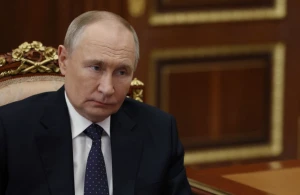
On dilemma: either “we are about to lose” or “we need to negotiate something”
“Victory has many fathers, defeat is always an orphan”, or a bit about the responsibility of Ukraine and its partners
This is a popular topic to discuss nowadays, who is more to blame. “Criminal government”, bad society, bad partners. Of course, this whole discussion is well colored by the political preferences of some of its participants. But the backdrop for finding fault is certainly favorable: the enemy is advancing, our partners have almost all the discourse about negotiations (and not just Trump, in fact), and many Ukrainians believe that we are either “about to lose” or “need to negotiate something.”
Let me just remind you: when Ukraine repelled an attempt to seize Kyiv, and especially after Kharkiv and Kherson, Western military and politicians happily boasted that “we taught them everything.” And then - if Woodworth is to be believed - they easily succumbed to Putin's nuclear blackmail. Now, when we are forced to exchange Russian losses and time on the territory, we can look for the problem in Ukraine and Ukrainians. Of course, Ukrainians do not remain in debt. Especially the government, for whom it is politically natural.
Of course, the government has a lot to criticize for. There are plenty of mistakes (personnel and management) and miscalculations (especially those discovered in hindsight).
There is something to blame ourselves, society and the state for. Because now we are living with the institutions, society, and state that we have built over 30 years. And it is impossible to change it radically during the war.
And yes, without our partners and their money, we would be in trouble. But in many issues, including the supply of weapons, authorization of their use, and restrictions on Russia, both the EU and the US are acting cowardly or outright hypocritical. This is a fact.
And those who repeat the frankly idiotic formula “you have to start with yourself, and help will come” seem to have really listened to too many personal growth trainings. No empire, not even a great one, has ever withstood a world war without external resources, especially when the war was fought on its territory. Neither France, nor Britain, nor the USSR, nor the United States, which emerged from World War II in debt.
And even now there are examples of countries that are acting on their potential much more decisively and consistently than the “big players”. These are the Scandinavian countries, which allocate many times more relative to GDP than the United States or large European countries. And they are not chasing after Ukraine with an attempt to “hang” a guilt complex on the victim of aggression.
The current restrictions on Ukraine and very slow aid will not destroy us as a state. Still, we are getting help, and we are building factories with the Belgians and Germans, and we are creating weapons. So we will make it.
But this specific policy stretches and scales the challenges. Our partners will have to respond to them. I myself have explained many times the reasons for their caution, but this does not change the result. They will shovel out problems not even through Ukraine, but collectively.
So they didn't crush the Wagner Group in Ukraine and didn't drive Russia out of the Sahel, and there is already a war in Sudan. Which will be an even bigger problem for Europe and the United States. There are already 13 million refugees there (there were 10 in August), 500,000 of them are already in the EU, and 25 million are on the verge of starvation. It will burn somewhere else, because the huge Sudan will export radicalism and instability, provoking crisis after crisis in Africa. This will increase both economic and migration pressure.
And the fact that Putin was not beaten quickly leads to the worst-case scenario that our partners fear with regard to Russia. In fact, chaos and collapse during the transfer of power. Putin is trying very hard to turn his country into a territory saturated with hatred and Nazism, which will sooner or later explode. And chaos in Russia is really a global challenge. And who will be responsible for this? Apart from the Russians themselves?
Why? Because they did not give Ukraine weapons and permission to win the war relatively quickly. And even if the war ends tomorrow, Putin's regime will most likely have passed the point of no return. Just like the USSR, which collapsed after the end of the Afghan war. And it will be as usual. What they feared, they got.
And here it will not even be possible to name a few names of the “guilty”. These are systemic policy bugs. Which will have to be treated when this cycle of war and confrontation ends.
About the author. Yuriy Bohdanov, publicist, specialist in strategic communications in business, public administration and politics
The editors do not always share the opinions expressed by the authors of the blogs.
- News














































